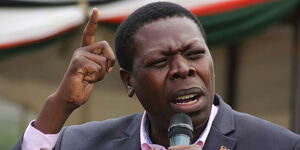In the months running to the August 8, 2017 elections, Jubilee Party was one of the most preferred by politicians countrywide owing to its large support base.
After the elections, Jubilee took the country by storm, establishing dominance in both the National Assembly and the Senate. The President Uhuru Kenyatta-led party also won majority of gubernatorial seats hence taking control of the Council of Governors.
In the 12th Parliament, Jubilee had 165 Members of Parliament (MPs) and 24 Senators.
The party also bagged 25 out of the 47 gubernatorial seats in the country.
However, the party failed to replicate its performance in the just concluded 2022 General Election. In this year's election, Jubilee won only 31 parliamentary seats, a number that is inclusive of the Woman Representative positions.
Jubilee’s Crumble
Jubilee was birthed in 2016 after the merger of 12 political parties led by The National Alliance (TNA) and United Republican Party (URP), which had formed the Jubilee Alliance in 2013.
Other parties that merged to form Jubilee Party were New Ford Kenya Party, Alliance Party of Kenya (APK), and the Republican Party (RC).
President Uhuru Kenyatta and his deputy, William Ruto, used the party to successfully seek re-election in 2017. Besides forming the government, the duo also enjoyed a majority support in Parliament.
However, a handshake between President Uhuru Kenyatta and his then antagonist, Raila Odinga, barely a year into the second term handed the once powerful party a death sentence.
Ruto and a number of parliamentarians allied to him opposed to the handshake and eventually formed a break-away group that would subsequently culminate in the birth of the United Democratic Alliance (UDA).
The formation of UDA escalated the bad blood between Uhuru and Ruto, with the Head of State launching a full fledged war to block his deputy from ascending the power.
The President and his deputy also took divergent ways during the contentious attempt to introduce constitutional reforms through the Constitutional (Amendment) Bill, 2020, famously known as the Building Bridges Initiative (BBI). DP Ruto and his allies opposed the reforms while the Uhuru-led group supported the changes.
The fallout escalated when the Jubilee Party took disciplinary action against members opposed to the party’s positions. Among the first casualties of the purge was Elgeyo Marakwet Senator, Onesmus Kipchuba Murkomen, who was ousted in his position as the Leader of the Majority in the Senate in 2020.
Newly elected Nakuru governor, Susan Kihika, was also axed from her position as the Senate Majority Whip.
The purge would later on fall on the long-time ardent defender of the Jubilee government’s positions in Parliament, Aden Duale. The Garissa Township MP, and a close ally of DP Ruto, was axed from his position as the Leader of Majority in the National Assembly.
In addition, members allied to Ruto and his break-away group dubbed “the Tanga Tanga” were also removed from their positions in various House Committees.
Opposition Within Government
The victims of the purge would later find solace in UDA.
Agitated by the purge from Jubilee leadership, DP Ruto and his foot-soldiers embarked on a rigorous campaign, criticizing the policies and failures of Uhuru’s regime.
The President retracted his former support to endorse his deputy as his preferred successor after his retirement. Uhuru instead endorsed his newly found ally, Raila Odinga.
In the August 9 elections, the DP Ruto-led party registered tremendous performance in the Mount Kenya region and the Rift Valley where the Jubilee Party bagged majority seats in the 2017 elections.
The party, for example, won all parliamentary seats in Murang’a and Kirinyaga counties.












